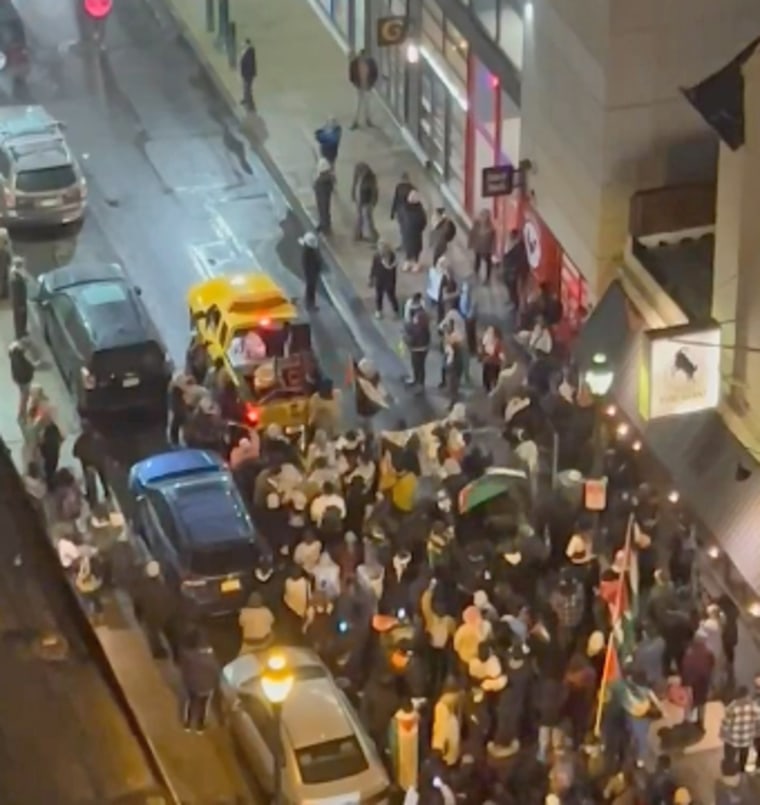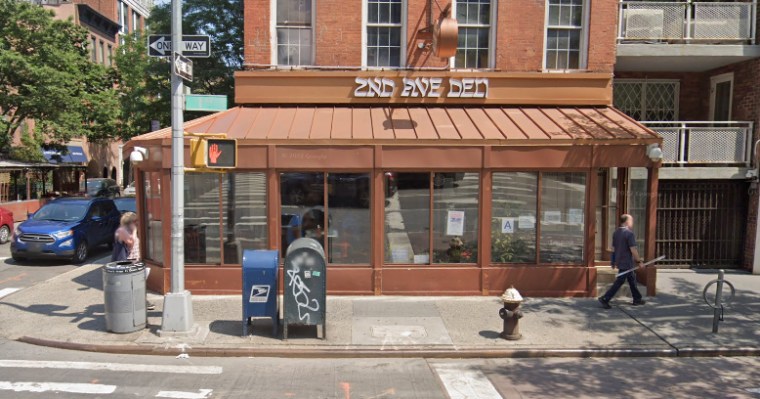From food carts to fine dining establishments, Jewish and Arab American-owned eateries have become another flashpoint amid the Gaza conflict, with some facing acts of vandalism and harassment or being targeted by demonstrators.
A pro-Palestinian rally two weeks ago in front of Townhouse, an upscale restaurant and bar in downtown Detroit, led its owner to contact law enforcement and increase security, a spokesman said. In social media posts, people could be heard chanting to Jeremy Sasson, CEO of the Heirloom Hospitality Group, "How many kids did you kill today?" Demonstrators waved Palestinian flags as police monitored from across the street, while another group held an Israeli flag in opposition.
Restaurants and food culture have historically attracted protests and boycotts — from the Boston Tea Party to lunch counter sit-ins of the Civil Rights era — gaining importance because of their public visibility and representation of a community.
Sasson, who is Jewish American of Israeli descent, has previously said he has received antisemitic backlash — and a slew of negative online reviews — for being a staunch supporter of Israel. Palestinian activists, however, have countered that they are not against a person's religious beliefs, but rather against support of the Israel Defense Forces.
But Sasson denies holding any significant sway.
"As a Michigan-based Jewish business owner with no ability to impact or influence the power or actions of the Israeli government, these protests feel like an effort to shame, embarrass or punish me for my religion, and less like an effort to benefit the numerous Palestinians suffering in Gaza," he said in a statement to NBC News. "I'm not an activist, I'm not an Israeli citizen and it's clear that the protestors are comfortable using anti-Zionism to justify antisemitism."
But with an ongoing war nearing its third month and a death toll continuing to climb, U.S. restaurateurs such as Sasson have found themselves at the center of another type of controversy, whether it's because they are vocal about who they are, speaking openly about the fighting between Israel and Hamas, or simply operating a business that is distinctly tied to a Jewish or a Palestinian identity.

While an exact number of affected eateries is unclear, the instances have been piling up in recent weeks — a Jewish-owned bagel shop in Miami, a Palestinian-owned tea house in Cleveland, a Jewish deli in Los Angeles, a kosher eatery in New York and a Mediterranean restaurant in Madison, Wisconsin.
Police in Madison said the Dubai Mediterranean Restaurant suffered "substantial damage," including anti-Islamic graffiti, during early Tuesday and are investigating it as a potential hate crime.
The restaurant reopened Thursday and thanked patrons on Facebook for their support, writing, "Hate does not have a place and will not stop us."
In Philadelphia earlier this month, a crowd gathered in front of Goldie, an Israeli-style falafel shop — "Goldie, Goldie, you can't hide. We charge you with genocide," demonstrators chanted — drawing condemnation from the White House and Pennsylvania Gov. Josh Shapiro. (Two employees at Goldie, which is co-owned by the Israel-born chef Michael Solomonov, say they were fired for wearing pro-Palestinian flag pins at work, The Philadelphia Inquirer reported.) Goldie did not immediately respond to a request for comment.
In Brooklyn, New York, the Palestinian chain restaurant Ayat, which was featured in The New York Times in October for having a sizable Jewish customer base and has a menu that includes a mention of "down with the occupation," later told The Associated Press it was receiving "nonstop" threatening voicemails, co-owner Abdul Elenani said. On Yelp, the reviews range from accusations the restaurant is "antisemitic" to being "victims of racism and hate."
In an Instagram post Thursday, Ayat defended the language on its menu.
Also in New York City, a former national security adviser in the Obama administration was arrested last month and charged with harassment and stalking after videos allegedly showed him harassing and verbally abusing a food cart vendor in Manhattan with Islamophobic language.
"You support killing little children," the former adviser, Stuart Seldowitz, 64, told the vendor in one of the videos.
Seldowitz could not be reached for comment, but in an interview with NBC New York he said that he is sensitive to the tensions caused by the Israel-Hamas war and was triggered when the vendor allegedly said he backed Hamas.
"The comments that went beyond him and interpreted on attacks against Muslims and Arab Americans and so on were probably not appropriate," Seldowitz said. "The comments I made calling him out for his support of terrorism, I think those were appropriate."
Eateries are public consumer spaces and are generally accessible to anyone, which makes them prime spots for people to exert influence and financial support, said Angela Jill Cooley, an associate professor at Minnesota State University who studies foodways and the history of segregated restaurants.
But there are differences between what's happening today and with past protests.
"During the Civil Rights Movement, Black Americans were protesting local businesses, and those local businessmen could influence and did influence the local government to change their laws and practices," Cooley said. "I wouldn't imagine that Jewish or Middle Eastern restaurants have any influence over Israel or Hamas."
Still, "because they are Jewish spaces and Middle Eastern spaces, it would make these places very obvious symbols of a particular culture," she added.
In recent weeks, groups that track bias have seen a reported surge in antisemitic threats and incidents, as well as an uptick in similar Islamophobic occurrences.
Restaurant owners say these events can come at a financial cost as well, forcing them to step up security measures or lose out on business.
Jeremy Lebewohl, owner of 2nd Ave. Deli in Manhattan's upper east side, said his storefront was vandalized with a swastika after making pro-Israel social media posts in October. Since then, he's instructed his staff to be "extra aware" and has hired a guard.
"It's a sad reality, but we have to be aware of what's going on. If someone leaves a bag on the floor that's unattended ...," he said, trailing off.

He said he reported the swastika vandalism to the New York City Police Department, but has not heard of any updates in the case. The NYPD said Friday no arrests have been made, but the investigation is ongoing.
What has stood out to Lebewohl since the incident is both the hostility and support that his deli has received.
"I know people have written horrible, disgusting things" on social media, he said. "We've received messages from people saying they would never come to our restaurant because of our support for Israel."
But there are glimmers of kindness as well, he added, which gives him hope: "We've had customers coming in and telling us they're there specifically because of the swastika and what's going on."
"conflict" - Google News
December 30, 2023 at 12:22AM
https://ift.tt/SamZ85i
Why U.S. restaurants and eateries have become a flashpoint in the Gaza conflict - NBC News
"conflict" - Google News
https://ift.tt/982sv6M
https://ift.tt/dJGQbP8
Bagikan Berita Ini














0 Response to "Why U.S. restaurants and eateries have become a flashpoint in the Gaza conflict - NBC News"
Post a Comment